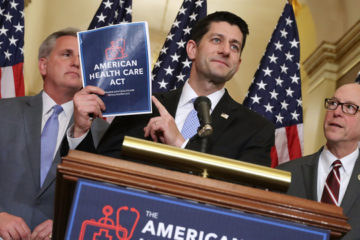GOP Needs Trump’s Salesmanship to Advance New Obamacare Plan

published Mar 6th 2017, 7:01 pm, by Billy House
(Bloomberg) —
Republicans in Congress hope a new draft bill released Monday night will jump-start their stalled Obamacare repeal effort, though the most important factor may be how hard President Donald Trump works to sell it to lawmakers.
Two House committees released long-awaited draft measures that House Speaker Paul Ryan and GOP leaders negotiated with the White House, and made expedited plans to take up the measures Wednesday.
The proposal would scrap the underpinnings of Obamacare, including its mandate to buy insurance and many of its taxes, and establish a new refundable, age-based tax credit to help people buy insurance. Leaders aim to get a final measure to Trump’s desk by mid-April, which leaves little room for error.
But the legislation faces a difficult path because it will likely be opposed by at least two Senate Republicans who object to its defunding of Planned Parenthood. It also faces strong objections from House conservatives, who say the refundable tax credits would create a new, expensive entitlement program.
GOP leaders’ strategy appears to be to put forward a plan with Trump’s support and make it difficult for leery Republicans to vote no. Leaders are banking on rank-and-file members, many of whom represent districts where Trump is popular, to be afraid the president will go after them at re-election time if they vote against the measure.
Trump’s personal involvement will probably be needed to get a repeal-and-replace measure through both chambers in what will be the first test of his ability — and willingness — to delve into the arm-twisting politics needed to enact controversial legislation.
The draft measures, released by the House Ways and Means Committee and the Energy and Commerce panel, retain some of the most popular elements of Obamacare, including a prohibition on insurers denying coverage to those with pre-existing condition. But the draft makes a key change that allows insurers to charge those who don’t maintain continuous health coverage up to 30 percent more.
The House panels will consider the bills even before the Congressional Budget Office has delivered its estimate of the costs, as well as how many Americans would lose coverage under the changes.
Even so, some House conservatives showed new signs of softening their opposition, even before the new drafts were released, saying that GOP leaders were making needed changes and improving their plan.
“I understand that the current GOP plan is being revised and modifications are being made daily. Any changes that will lower health-care costs will be welcomed and applauded,” Representative Mark Meadows of North Carolina, a leader of the Freedom Caucus, said earlier Monday in an emailed statement.
Mick Mulvaney, Trump’s budget director and a former Freedom Caucus member when he served in the House, signaled Monday on a radio show that the president is supportive of the repeal and replace approach being set by Ryan.
‘Something Even Better’
“The idea is to do exactly what the president talked about on the campaign – repeal it and replace it with something even better,” Mulvaney said.
Ryan is counting on the idea that it will be difficult to tell the new president no.
“Either you want to repeal and replace Obamacare or you don’t. I think Republicans are going to say ‘yes’ to that in Congress,” Ryan said in an interview Friday on Fox News. “When we have decisions that this is the consensus among Republicans, this is the direction the president wants to head, we’re going to unify and get things done, and that’s what I’m confident about.”
Some conservatives, including Freedom Caucus member Jim Jordan of Ohio, have repeatedly said they prefer to focus on a repeal bill now and work out the GOP’s internal differences over a replacement plan later.
But the dynamics are different in the House and Senate, meaning that Trump and GOP leaders will have to strike a complex balance to meet their stated deadline of enacting the measure before Easter.
“Because the opposition in each chamber comes from different sides of the party, the president will need a nuanced approach,” said Joshua Huder, a senior fellow at the Government Affairs Institute at Georgetown University in Washington.
“Conservatives in the House are more interested in repeal than replace. In the Senate, moderates are more interested in replacing than repealing the bill,” Huder said.
Refundable Tax Credit
Republicans have disagreed in recent weeks over proposals to use a refundable tax credit to help some people pay for health-care coverage and whether to roll back Obamacare’s Medicaid expansion that some states accepted and others refused to implement.
The president’s public statements have sometimes been at odds with GOP lawmakers. Trump has promised better, less expensive care for all without cutting entitlement programs, such as Medicare, while Republicans in Congress have admitted that their plan is likely to cover fewer of the 20 million people who gained coverage under the Affordable Care Act.
Huder notes Trump did well in conservative House districts last November where most conservatives were elected by large margins. But in the Senate, he said, the president will need to convince moderates that whatever emerges from the House won’t endanger them in 2018 or 2020.
Senate Odds
Getting a bill through the Senate could prove a tougher challenge for Trump. Two Senate Republicans — Susan Collins of Maine and Lisa Murkowski of Alaska — oppose plans to defund Planned Parenthood as part of the effort.
White House spokesman Ninio Fetalvo confirmed that Trump suggested to Planned Parenthood that if it stopped performing abortions, it could preserve federal funding, pointing to the president’s statement to the New York Times on Monday.
“There is an opportunity for organizations to continue the important work they do in support of women’s health, while not providing abortion services,” Trump said in the statement.
Several other senators, including Murkowski, Shelley Moore Capito of West Virginia and Rob Portman of Ohio, have demanded a final bill that protects the people covered now under the expansion of Medicaid.
Another senator, Bill Cassidy of Louisiana, has led the charge with Collins for a far more robust replacement funded by keeping in place the Obamacare taxes, minus the requirement that almost all individuals have health insurance. Cassidy’s bill would let states keep Obamacare if they want and replace the individual and employer mandates with a provision allowing states to automatically enroll eligible people unless they opt out.
On the other end of the spectrum, Rand Paul of Kentucky, denounced the details in the expected package as “Obamacare lite” — including penalty premiums for people who let their insurance lapse; a new tax on higher cost employer-provided benefits; and the refundable tax credits for people too poor to pay income taxes.
The health-care industry is also looking to see how Trump handles the repeal effort. Investors were looking to Trump last week to provide detail on the plan to repeal and replace Obamacare in his speech to Congress. Instead he spoke in broad terms about ensuring access to coverage, lowering costs and providing better care.
Health and Human Services Secretary Tom Price reiterated the same standards Sunday on CBS News’ “Face the Nation” and said the administration would propose a plan “very, very soon.”
Health Insurance Executives
The president only recently met with health insurance executives, calling them to the White House last week and promising them “something special.” Trump’s administration has previously said it was working on its own health plan and would reveal it around mid-March.
Insurers have said they need stability in the marketplace to continue offering plans on the Obamacare exchanges until a replacement is established. Many insurance companies including UnitedHealth Group Inc. and Aetna Inc. have largely dropped out.
Trump has talked about stabilizing the insurance market, but it’s getting late for insurers who need make a decision over the next few months as to whether they will offer plans in the exchanges or if more will exit.
Updates with Trump’s Planned Parenthood statement under “Senate Odds” subhead.
–With assistance from Anna Edney, Anna Edgerton, Steven T. Dennis and Justin Sink.To contact the reporter on this story: Billy House in Washington at bhouse5@bloomberg.net To contact the editors responsible for this story: Kevin Whitelaw at kwhitelaw@bloomberg.net Michael B. Marois
COPYRIGHT
© 2017 Bloomberg L.P
NICODES





No Comment